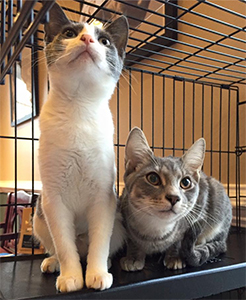We know what it feels like – you look out your kitchen window to see a cat running through the back yard, or maybe searching around your trash can for food. When you step out the door, the kitty disappears, running into the woods or tall grass without giving you a second thought. You think to yourself, “The poor thing is so thin, it must be starving. Maybe I should put out some food…”
They say the path to hell is paved with good intentions, and the same may be true about the cat population. The cat population in the United States has exploded and continues to grow, and many of these cats will never benefit from human contact. The breeding rate of felines makes it possible for cats to increase their population exponentially in a very short period of time, and these feral cats suffer from a variety of diseases and health conditions, including many that are spread to humans.
In addition to the suffering that stray cats endure, outdoor cats, both feral and domestically owned, in the United States and the UK are the greatest contributor to the extinction of native species. They have been named as the second most destructive invasive species of mammal worldwide. Cats are “apex predators” in many ecosystems that do not already contain hunters with such versatile and effective means of hunting. A single outdoor cat can kill more than 1000 small animals in a single month, often decimating species that have no instincts to protect them from a very talented predator.

But what can you do? Even those cats that are friendly and are willing to be invited to live indoors are often infected with diseases that make them unwelcome in homes, and TNR (Tag/Neuter/Release) programs do almost nothing to decrease an outdoor cat’s effect on the local native species or prevent them from spreading infectious diseases. Even healthy, friendly cats have trouble finding homes as more and more cats find their way into rescues. How can you have an effect on such an enormous issue?
Fortunately, there are lots of ways you can help. The simplest and most effective way is to take responsibility for your own cats. Vaccinate and neuter your cats, and keep them inside unless you can supervise them while they are outdoors. Never feed any animal outdoors and do not leave food out for loose cats you see in your area. A good rule is that you should not feed any animal you have not neutered and vaccinated. This includes cats that have been part of a TNR program – if you must feed a re-released cat, do so in a shed or garage and at a routine time of day, so that you do not have to leave food out for wildlife and other feral cats.
If you want to take a more pro-active step, start by finding out about programs that can help cats in your area. You can often help as easily as offering a donation, but volunteer efforts like offering to send out educational mailings in your neighborhood, working a day or two every week at a local rescue shelter, or even trapping cats for local rescues can be great ways to help. Consider fostering cats that are looking for a home or are waiting to go to a long term, no-kill shelter. Fostering can help a cat acclimate to indoor life and give a feral cat a far better chance to find a loving home rather than ending up in a rescue. Be sure to talk to your vet about how to do this safely and without exposing your other pets to health risks.
Remember that the most effective way to help is to be a responsible pet owner. Your cat should always be kept indoors unless you are watching the cat so that it cannot roam. This not only protects the environment from your cat, but it keeps your cat from mingling with other cats who may carry deadly diseases like FIP and FIV, prevents the spread of feline leukemia and toxoplasmosis, and keeps you and your family safe from chlamydia and other diseases that can be passed from cat to cat to human.

If you want more information about loose cats, saving feral cats, and cat rescue organizations in your area, check out the following web sites:

